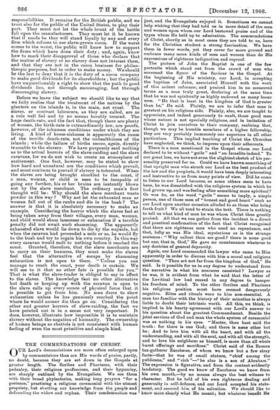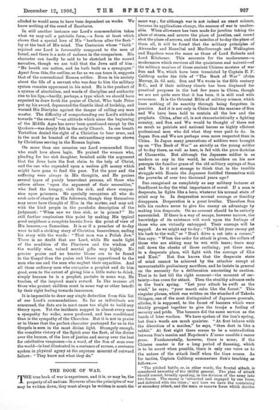THE COMMENDATIONS OF CHRIST.
OUR Lord's denunciations are more often enlarged upon by commentators than are His words of praise, partly, no doubt, because they are set down in the Gospels at greater length. The Scribes and Pharisees, with their pedantry, their religious professions, and their hypocrisy, are sharply outlined by the Evangelists. We see them with their broad phylacteries, making long prayers "for a pretence," practising a religious ceremonial with the utmost propriety, but shutting out knowledge from the people and defrauding the widow and orphan. Their condemnation was
just, and the Evangelists enjoyed it. Sometimes we cannot help wishing that they had told us in more detail of the men and women upon whom our Lord bestowed praise and of the types whom He held up to admiration. The commendations of Christ, shortly as in most cases they are told to us, have for the Christian student a strong fascination. We have them in fewer words, yet they cover far more ground and embrace many more kinds of men and women than do His expressions of righteous indignation and reproof.
The picture of John the Baptist is one of the few portraits which stand out from the crowd of men who surround the figure of the Saviour in the Gospel. At the beginning of His ministry, our Lord, in accepting the baptism of John, associated Himself with the work of this ardent reformer, and praised him in no measured terms as a man truly great, declaring at the same time that he was not spiritually as highly endowed as many lesser men. " He that is least in the kingdom of God is greater than he," He said. Plainly, we are to infer that man is greatest on his religious side. Plainly, also, we are taught to appreciate, and indeed generously to exalt, those good men whose nature is not specially religious, and in imitation of Christ to join ourselves to their company, realising that, though we may be bumble members of a higher fellowship, they are very probably immensely our superiors in all other particulars. This implied teaching of Christ the Churches have neglected, we think, to impress upon their adherents.
There is a man mentioned in the Gospel whom our Lord declared to be without " guile " and " an Israelite indeed." To our great loss, we have not even the slightest sketch of his per- sonality preserved for us. Could we have known something of that upright man who struck our Lord as the best product of the law and the prophets, it would have been deeply interesting and instructive to us from many points of view. Did he come to listen to our Lord because, as some others seem to have been, he was dissatisfied with the religious system in which he had grown up, and was feeling after something more spiritual? Or was he, as the word " guile " seems to imply, a simple person, one of those men of " honest and good heart " such as our Lord upon another occasion alluded to as those who bring forth fruit ? We all tend to strain the text. There is nothing to tell us what kind of man he was whom Christ thus greatly praised. All that we can gather from the incident is a direct and practical confirmation of the fact that Christ recognised that there are righteous men who need no repentance, and that, lofty as was His ideal, mysterious as is the strange sentence: "Why callest thou me good P there is none good but one, that is, God," He gave no countenance whatever to any doctrine of general depravity.
Again, our Lord commended the lawyer who came to Him apparently in order to discuss with him a moral and religious question. "Thou art not far from the kingdom of God," He said. Is it possible for us in any degree to understand from the narrative in what his nearness consisted P Lawyer as he was, it is evident from what he said that the letter of the Levitical law had ceased in any degree to hamper his freedom of mind. To the other Scribes and Pharisees his religious position must have seemed dangerously negative. Rites and rituals were to him non-essential. A man too familiar with the history of their minutiae is always liable to doubt their intrinsic worth. All this, we think, is implied in his hearty agreement with our Lord's answer to his question about the greatest Commandment. Beside the joint services of God and man the whole system of ceremonial was as nothing in his eyes. "Master, thou hest said the truth: for there is one God; and there is none other but he: And to love him with all the heart, and with all the understanding, and with all the soul, and with all the strength, and to love his neighbour as himself, is more than all whole burnt offerings and sacrifices." Christ said of the Roman tax-gatherer Zaceleus, of whom we know but a few stray facts=that he was of small stature, "chief among the publicans," and " rich "—" he also is a son of Abraham." The expression is figurative, and from the context evidently laudatory. The good we know of Zacchmus we know from his own mouth,—by no means always the best witness to character. But he told of his own righteous dealing and generosity in self-defence, and our Lord accepted his state- ment, and assured him of his salvation. We should like to know more clearly what He meant; but whatever benefit He
alluded to would seem to have been dependent on works. We know nothing of the creed of Zacchteus.
In still another instance our Lord's commendation takes what we may call a patriotic form,—a form at least which shows that a special hive of His " brethren after the flesh " lay at the back of His mind. The Centurion whose "faith" rejoiced our Lord is favourably compared to the men of 'Israel, and there' is a note of sadness in the comparison. His character can hardly be said to be sketched in the sacred narrative, though we are told that the Jews said of him
• "He loveth our nation, and he bath built us a synagogue." Apart from this, the outline, so far as we can trace it, suggests that of the conventional Roman soldier. Even in his anxiety about the life of a servant who was dear to him the military System remains uppermost in his mind. He is the product of a system of absolutism, and words of discipline and authority rise to his lips,—hardly, perhaps, a type which we should have expected to draw forth the praise of Christ, Who bade Peter put up his sword, deprecated the Gentile ideal of lordship, and warned His Disciples against the danger of calling any man master. The difficulty of comprehending our Lord's attitude towards "the sword "—an attitude which since the beginning of the Middle Ages has never been questioned except by the Quakers—was deeply felt in the early Church. In one breath Tertulliatt denied the right of a Christian to bear arms, and in the next he boasted of the extraordinary courage shown by Christians serving in the Roman legions.
On more than one occasion our Lord commended those who exalt love above logic. He praised the woman who, pleading for her sick daughter, brushed aside the argument that the Jews have the first claim to the help of Christ, and the one who expended upon a useless gift money which might have gone to feed the poor. Yet the poor and the suffering were always in His thoughts, and He praises several types of purely benevolent persons, all those who relieve others " upon the argument of their necessities," who feed the hungry, visit the sick, and show compas- sion upon prisoners. He specially recognises all who do such acts of charity as His followers, though they themselves may never have thought of Him in the matter, and may ask with the kind people in the parabolic description of the judgment: "When saw we thee sick, or in prison?" He still further emphasises this point by making His typical good neighbour a complete heretic from the point of view of His hearers,—a Samaritan. It is as if a preacher of to-day were to tell a striking story of Christian benevolence, ending his story with the words : " That man was a Polish Jew." There is no doubt that our Lord, while He made light of the erudition of the Pharisees and the wisdom of the worldly wise, valued mental gifts very highly. No greater praise and no heavier blame are to be found in the Gospel than the praise and blame apportioned to the men who use and the men who neglect their capacities. And all those ordinary men who recognise a prophet and do him good, even to the extent of giving him a little water to drink, simply because be is a prophet, partake in some way, He teaches, of the inspired man's reward. In like manner all those who protect children must in some way or other benefit by their right feeling towards innocence.
It is impossible to draw any single deduction from this list of our Lord's commendations. So far as individuals are concerned, the data are in moat cases too slight to build any theory upon. Yet the incidents suggest in almost every case a sympathy far wider, more profound, and less conditional than is the sympathy of the Churches. But it is not in praise or in blame that the perfect character portrayed for us in the Gospels is seen in the most divine light. Strangely enough, the complete victory of the Spirit over the flesh, of the divine over the human, of the love of justice and mercy over the lust for retributive vengeance—in a word, of the Son of man over the world—is best illustrated in a sentence of excuse, a sentence spoken in physical agony at the supreme moment of outward failure : " They know not what they do."































































 Previous page
Previous page